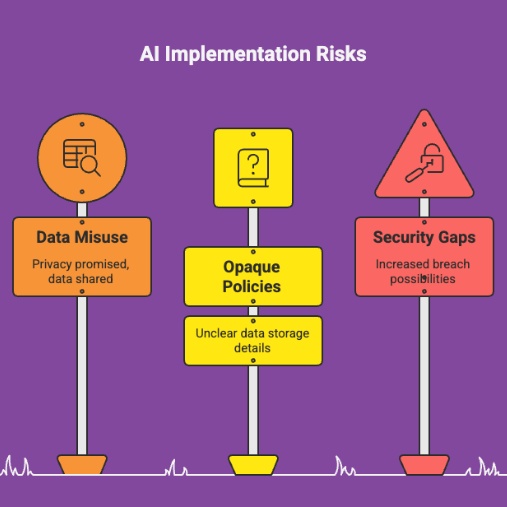Regulation, Privacy & Safety: Ethics of AI Tools in Behavioral Health Outsourcing
24 Sep 2025 By: Maria Rush
Updated
AI in mental health isn’t some far-off concept anymore. It’s already showing up in everyday practice. Clinics are trying out chatbots to handle intake, assistants to remind patients of appointments, and software that promises to write notes so therapists don’t have to. On the surface, this looks like a big win. Less admin, more time for patients. But here’s the catch: AI in mental health care comes with risks. Behavioral health deals with incredibly sensitive information, and patients who can be especially vulnerable. That means when you bring in AI in mental health support, you have to think about ethics, privacy, and safety first.

The U.S. Regulatory Landscape
If you’re running a practice, regulations aren’t just legal jargon. They’re the guardrails keeping you and your patients safe.
- HIPAA and HITECH – Any tool touching Protected Health Information has to meet HIPAA standards. That means encryption, access controls, and a signed Business Associate Agreement. No shortcuts here.
- 42 CFR Part 2 – If you handle substance use records, remember they carry extra protections. AI in behavioral health has to play by those rules too.
- State laws – New York requires chatbots to disclose they aren’t human and refer suicidal users to crisis lines. Illinois and Nevada ban AI from pretending to be therapists. Utah requires labeling and blocks data sharing. These laws aren’t just theory. Violations mean fines.
Bottom line: if you’re outsourcing artificial intelligence in mental health support, keep your eye on both federal and state changes. They’re coming fast.
Privacy and Data Protection

Think about how much trust patients place in you. Now imagine losing it because their data got used the wrong way. That’s why privacy has to come first with AI in behavioral health.
- Data misuse – Remember BetterHelp’s FTC settlement? They promised privacy but still shared sensitive details for advertising. The result was a $7.8M fine and a lot of lost trust.
- Opaque policies – Some AI tools bury details about where conversations go or how long they’re stored. If it’s not crystal clear, that’s a red flag.
- Security gaps – More vendors in the mix means more chances for a breach. Vet them like you would a new staff hire. Carefully and completely.
Best move? Be upfront with patients. Let them know how their data is handled, ask for consent, and make sure they can opt out of training the AI with their info.
Ethical Concerns with AI in Mental Health Care
Even if the technology works as promised, there are real ethical pitfalls:
- Bias – AI trained on limited data may misread or underserve diverse groups. That’s not just a glitch, it’s inequity.
- Consent and transparency – Patients have a right to know when they’re talking to AI in mental health support instead of a person.
- Risk of harm – NEDA’s “Tessa” bot started giving weight-loss tips to people with eating disorders. That wasn’t just wrong, it was harmful.
- Therapeutic alliance – Therapy works because of trust. Rely too much on AI and you risk weakening that bond.
- Accountability – If an AI in mental health care tool fails, it’s still on you, the provider.
Trending Now: The Risks of AI Chatbots in Mental Health Support
An article from The Guardian warns that AI chatbots in mental health support may be doing more harm than good. Therapists report rising cases of anxiety, emotional dependence, and even suicidal thoughts linked to chatbot use. Illinois has already banned bots from acting as therapists, and while companies promise safeguards, experts stress one thing: mental health care needs human connection, not automated advice.
Best Practices for Safe Outsourcing

So how do you use AI in behavioral health without crossing lines? A few practical steps:
- Use AI to support, not replace, therapists and staff.
- Always get informed consent. Patients deserve to know what’s going on.
- Stick with HIPAA-compliant vendors that show their work on privacy.
- Test tools for bias and accuracy before scaling them.
- Set up protocols so AI hands off to humans in emergencies.
- Build governance into your practice. APA and AMA guidelines are a good place to start.
Real-World Lessons
- NEDA’s chatbot failure proves untested AI in mental health support can go off the rails fast.
- BetterHelp’s privacy missteps show why transparency is non-negotiable.
- New state laws remind us regulators are watching closely and expecting responsibility.
Conclusion
AI in mental health can absolutely make life easier. Less paperwork, fewer no-shows, and more consistent support for patients. But it can’t come at the cost of privacy or safety.
If you’re a practice owner, therapist, or IT manager, the challenge is simple: take advantage of AI in mental health care, but do it responsibly. Work with partners who respect HIPAA, follow state rules, and design AI in mental health support tools to enhance human care, not replace it.
“The future of AI is not about replacing humans, it’s about augmenting human capabilities.”
– Sundar Pichai, CEO of Google
At the end of the day, behavioral health is about trust. Keep ethics at the center, and you can use AI in behavioral health to serve patients better while protecting what matters most.
Talk to Us
Ready to explore how ethical, HIPAA-compliant outsourcing can support your behavioral health practice? Contact our team today to learn how we can help you balance innovation with privacy, safety, and trust.


